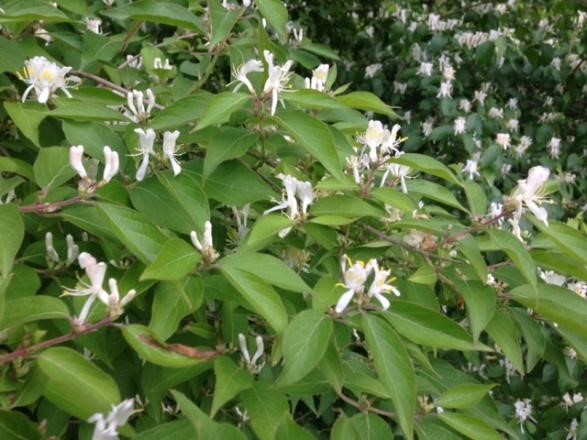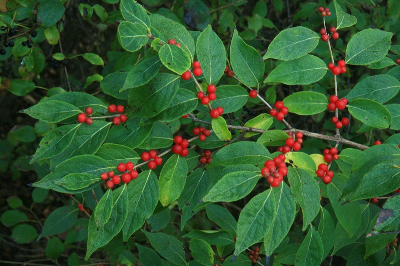What Is That Shrub?
It's
blooming now all over the place. You can find it crowding wooded areas,
filling in the edges of the roadside, popping up volunteer throughout
the yard, and even occasionally incorporated into the landscape. So what
is plant we are talking about? It's Amur Honeysuckle.
Amur
Honeysuckle (Lonicera maackii) was introduced by the New York Botanic
Garden back in the late 1800's. It was widely planted for wildlife cover
and to control soil erosion and has since escaped those areas and
established itself into the native areas throughout much of the eastern
U.S and on into the Great Plains where it now grows in rampant, choking
out much of the native plant population in the process.
In our
area, it will commonly be found taking over "natural" areas with its
aggressive growth. It starts as a small sprout but quickly reaches
greater size, becoming a large bushy plant of 10-15' in height, with
older plants becoming small bushy trees of 20' or more. It leafs out
very early in the spring, producing vigorous growth of bright green
leaves and shoots. By this time of the year it is blooming, producing
white to yellow flowers typical of honeysuckle that cover all portions
of the plant. Small bright red fruits follow and by fall, plants are
covered in these colorful fruits, soon to be eaten by birds and spread
into new areas. There is a lot about this plant that is actually
visually attractive, however the reality is that it's an ecological
disaster.


Control
and eradication is highly recommended. Young plants can be easily pulled
from the ground, especially when the ground is soft and moist. Larger
plants will need to be dug out or cut down and treated with stump
killer...don't forget this important step! Untreated stumps will sprout
back with a vengeance, very quickly regenerating new growth, making the
problem even worse than before. Immediately after cutting the bush out,
treat the fresh cut with Fertilome Cut Vine and Stump Killer to prevent
this from happening.

No comments:
Post a Comment